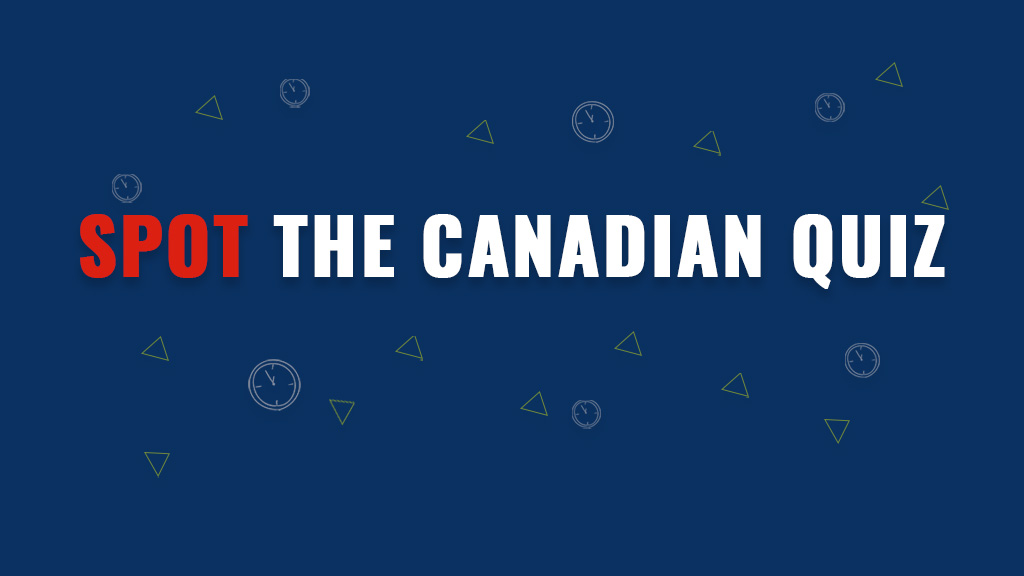❤️It's Trivia, but Sweeter❤️
Spot The Canadian Quiz

Canada is one of the most diverse and fascinating countries in the world, known for its expansive landscapes, rich history, and unique culture. The country is located in North America, bordered by the United States to the south, the Atlantic Ocean to the east, the Pacific Ocean to the west, and the Arctic Ocean to the north. With a population of over 38 million people, Canada is the second-largest country in the world by land area, spanning almost 10 million square kilometers.
A hallmark of Canadian identity is its bilingual nature, with both English and French being official languages. This duality is a reflection of Canada’s history, particularly the significant French influence in the eastern part of the country. Quebec, a province known for its French-speaking population, is the heart of this cultural divide, while the rest of Canada primarily speaks English. However, despite the linguistic diversity, there is a sense of unity among Canadians, as both languages are equally respected and used in government, education, and business.
Canada’s history is marked by a combination of Indigenous cultures, European colonization, and its path toward becoming an independent nation. The First Nations, Métis, and Inuit peoples have lived in what is now Canada for thousands of years, and their traditions and cultures remain integral to Canadian society. Early European settlers, particularly the French and British, began arriving in the 17th century. This laid the foundation for the country’s eventual confederation in 1867, when Canada became a self-governing dominion within the British Empire. Over time, Canada gained full independence, with the Statute of Westminster in 1931 and the patriation of the Constitution in 1982, marking the end of British legislative authority.
One of the defining features of Canada is its geography. The country’s natural beauty is renowned worldwide, from the majestic Rocky Mountains in the west to the lush forests and countless lakes found throughout the nation. Canada is home to several national parks, including Banff and Jasper, which attract millions of visitors each year. The vast wilderness also plays a critical role in Canadian identity, with outdoor activities such as hiking, skiing, and canoeing being popular pastimes for many Canadians.
Another key element of Canada’s identity is its cultural mosaic. Canada prides itself on being a welcoming and inclusive country, with a history of accepting immigrants from all over the world. This has led to the development of a multicultural society, where different ethnic communities coexist and contribute to the nation’s growth. Major cities like Toronto, Vancouver, and Montreal are celebrated for their diversity, offering a blend of cultural influences, food, languages, and traditions from around the world.
Canada is also famous for its contributions to the arts, including literature, music, film, and visual arts. The country has produced many world-renowned writers, such as Margaret Atwood and Leonard Cohen, whose works have had a global impact. In music, Canada is home to artists across various genres, from the rock legends of Rush to contemporary pop icons like Drake and Justin Bieber. The Canadian film industry has also gained international recognition, with directors like David Cronenberg and Denis Villeneuve making significant contributions to cinema.
In addition to its cultural richness, Canada is recognized for its achievements in various fields such as science, technology, and sports. The country has a long history of scientific discovery, including the development of insulin by Canadian scientists Frederick Banting and Charles Best. Canada’s advancements in technology and innovation continue to shape the global landscape, particularly in areas like artificial intelligence and clean energy. The country is also a leader in space exploration, with astronauts like Chris Hadfield gaining international fame for their work with NASA.
When it comes to sports, Canada is most famously associated with ice hockey, a game that has deep roots in the country. Ice hockey is considered the national sport, and Canadians are passionate about the game at all levels, from grassroots leagues to professional competitions. The National Hockey League (NHL) is home to several Canadian teams, and the country’s national team has achieved considerable success in international competitions, including the Winter Olympics. Other popular sports in Canada include lacrosse, skiing, and Canadian football, with many Canadians excelling in both amateur and professional settings.
Canada’s political system is a parliamentary democracy and constitutional monarchy. The country recognizes the British monarch as its head of state, currently Queen Elizabeth II, but the monarch’s role is largely ceremonial. The head of government is the Prime Minister, who is the leader of the party that holds the most seats in the House of Commons. The political landscape in Canada is shaped by several major political parties, with the Liberal Party, Conservative Party, and New Democratic Party (NDP) being the most prominent. Canada’s political system emphasizes the values of democracy, equality, and justice, and the country has a reputation for being one of the most peaceful and stable nations in the world.
Canada’s economic landscape is equally impressive, characterized by a highly developed and diversified economy. The country is rich in natural resources, such as oil, gas, minerals, and timber, which have long been central to its economy. Canada is also a leader in the tech industry, with growing sectors in telecommunications, software development, and digital media. The country’s economy benefits from strong trade relationships, particularly with the United States, which is Canada’s largest trading partner. The North American Free Trade Agreement (NAFTA), which was replaced by the United States-Mexico-Canada Agreement (USMCA) in 2020, has helped facilitate the flow of goods and services between the three countries.
Education and healthcare are also vital to Canada’s well-being, with both being publicly funded and accessible to all citizens. The Canadian education system is well-regarded, with the country consistently ranking highly in global education comparisons. Universities such as the University of Toronto and McGill University are known for their academic excellence and attract students from around the world. Healthcare in Canada is universal, meaning that every Canadian citizen has access to medical services without direct costs at the point of care. The Canadian healthcare system is often cited as one of the country’s proudest achievements.
In conclusion, Canada is a country that embodies the values of diversity, inclusivity, and freedom. Its expansive landscapes, rich cultural heritage, and progressive social systems make it a unique and admired nation. Whether it’s the breathtaking natural beauty, the achievements in various fields, or the friendly, welcoming nature of its people, Canada offers something for everyone. The country’s history of collaboration, resilience, and innovation has established it as a global leader in many respects, and it continues to evolve as a place where people from all walks of life can thrive.



